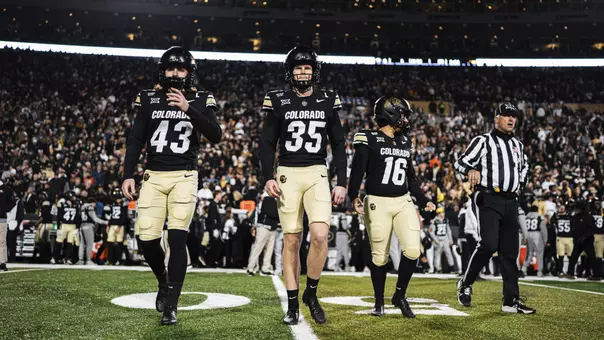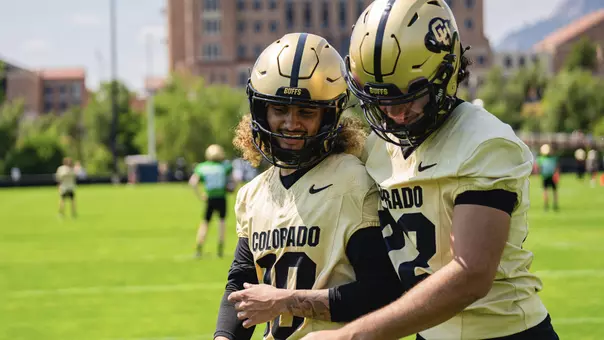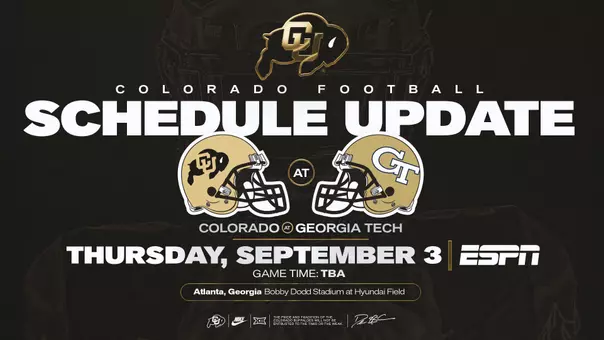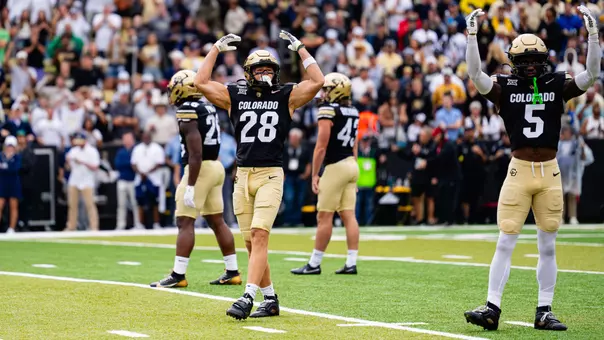Colorado University Athletics
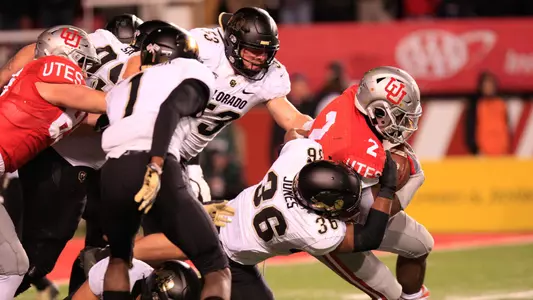
Woelk: Initial Takeaways From 2019 Buffs Season
December 01, 2019 | Football, Neill Woelk
BOULDER — On the surface, the Colorado Buffaloes' last three seasons have been similar. Each year, the Buffs finished with a loss that left them one game short of bowl eligibility.
But when you dig a little deeper, the difference between 5-7 in 2018 and the same record this year is dramatic. The Buffs are a different team. The foundation coach Mel Tucker began putting down a year ago is settling into place, and he and his staff are already in the process of building on those cornerstones.
Typically, we follow every game during the season with takeaways from that specific contest. But with 2019 now in the books, we'll look back at the season with an eye on the future at the same time.
Our initial takeaways from 2019:
1. The Buffs are physically and mentally tougher. Perhaps the most telling example of that improvement came in Week 10 of the season. With a five-game losing streak hanging over their heads — and memories of 2018's season-ending seven-game swoon all too real — the Buffs shook themselves out of their doldrums and beat Stanford, 16-13. One week later, they knocked off Washington for their first win over the Huskies since entering the Pac-12.
Two wins over two perennial Pac-12 powers sent the message that these Buffs were a different breed from years past. They showed an element of toughness against two programs whose calling card has been physical, fundamentally sound football — and they beat those programs at their own game.
That's something Buffs fans had not seen in a while. Aside from the 2016 senior-dominated bunch that won the Pac-12 South, the Buffs have not been a program known for its toughness.
That has changed, and it's no doubt a message that has been heard throughout the Pac-12.
2. The Buffs improved in the trenches. Tucker came to Boulder with the firm belief that good teams dominate up front on both sides of the ball. The Buffs made significant gains in both areas.
Even with five sacks by Utah in Saturday's finale, the Buffs still finished the year giving up just 21 quarterback sacks. It was the fewest since 2013 and a far cry from the 34, 39, 28 and 41 they had given up over the four previous seasons. The O-line also paved the way for a run game that averaged a respectable 156 yards per game for the season and nearly 150 yards per game in Pac-12 play — the fourth-best mark in the conference. Tucker has made it clear he wants the Buffs to run the ball on their terms, and they took a big step in that direction.
Defensively, CU finished with 24 sacks, including six from Terrance Lang on third down. But perhaps most importantly, the Buffs significantly improved their run defense. Colorado gave up just 140 yards per game on the ground in conference play, and held six conference opponents under 150. That's another part of Tucker's non-negotiable fundamentals: stop the run and force teams to throw.
Overall, both sides of the ball got better as the year progressed. Credit here to O-line coach Chris Kapilovic and D-line boss Jimmy Brumbaugh. They brought out the best in their players.
The best news? On defense, every lineman who took a snap this season is scheduled to return next year. Offensively, the Buffs lose two starters, but there are capable replacements waiting in the wings.
It means next year's groups are poised to take another step forward where it matters most — a key development for the program.
3. CU improved down the stretch. Far more often than not, this hasn't been the case in recent years. But as Tucker loves to say, the Buffs "kept chopping" and got better in November.
The defense, in particular, made dramatic improvements as players became more and more familiar with the defensive philosophy Tucker and defensive coordinator Tyson Summers were trying to implement. The Buffs trusted their coaches and the scheme and the results were positive.
That is a development that will be a big plus when the Buffs head into their second spring under Tucker.
4. Young players received critical playing time. This actually ties into the previous item — players improved as the calendar advanced.
But that trend was especially evident with younger players on the roster. True freshmen such as defensive backs Mark Perry, K.J. Trujillo and Tarik Luckett all got significant playing time as the season progressed and they all made plays. Offensively, youngsters such as running back Jaren Mangham and wide receiver Dimitri Stanley made big strides, as did sophomore running back Alex Fontenot.
There were also newcomers up front making a difference on both sides of the ball. That's the kind of depth that only experience can produce, and it's another piece of the puzzle that bodes well for the future.
5. There's no doubt what the biggest question will be headed into spring ball. For the first time in recent memory, the Buffs will go into the spring with no clear leader in the quarterback derby. It will make for a very, very interesting spring — and it will likely be a question that won't be settled until fall camp.
Will it be junior-to-be Tyler Lytle, who has been patiently biding his time for a real shot at the starting spot? Will it be sophomore Blake Stenstrom, who saw some time this year when both Steven Montez and Lytle were injured? Will it be a member of the upcoming recruiting class? Or could it be a spot where a transfer figures into the equation?
While nobody knows the answer, we do know this: it will no doubt be the most closely watched position battle between now and the 2020 season opener.
6. One more shoutout to the seniors. We've said it before from this corner, but it bears worth repeating — CU's seniors deserve a healthy round of applause for their leadership in Tucker's first season.
Transition years are never easy, but this group of seniors not only bought into everything Tucker brought to the table, they did their best to make sure every young player on the roster was wholly on board. They believed, they worked and they set the tone, and it's something Tucker no doubt appreciated. When he told the seniors "thank you" in the postgame locker room Saturday night, he clearly meant it.
7. There's work to be done on the recruiting trail. Lots of it. While Tucker's culture is clearly taking hold and the mentality of CU's locker room is no doubt changing, the mental makeup is only part of the equation.
As the saying goes, "It ain't the Xs and Os; it's the Jimmies and Joes."
Tucker and his staff are well-aware that they have to improve CU's roster in terms of depth and talent. More size, more strength, more playmakers who can make a difference in critical moments. Recruiting is the lifeblood of every successful program, and Tucker and his staff have made it clear that they will recruit every day.
If the current rankings are any indication, they are making headway. It's a process that won't flip the script in one year, but it is one that will help the Buffs take another step next season.
8. But it's more than recruiting. While the season is over, strength and conditioning coach Drew Wilson's work is just beginning.
When Tucker arrived, he gave Wilson the go-ahead to make changes in CU's conditioning program — and the result was a team that made dramatic improvements in almost every area. It not only showed in their weight room numbers, but more importantly, it showed in games. Of Colorado's five wins, four came because CU had the edge in the fourth quarter, another one of Tucker's fundamental tenets.
Guaranteed, Wilson's aim is to produce the same kind of improvement again during this offseason — and have it show up again next fall.
9. Tucker and his staff have made a difference. Every coaching staff has a big impact on players and the locker room attitude. The question is whether it is positive or negative.
If you use this year's Buffs as a barometer, Tucker's influence has been overwhelmingly positive. From top to bottom, starters to walk-ons, CU players have expressed an unwavering belief and trust in the CU staff. They love Tucker's approach, they appreciate his honesty and they believe in his coaching ability. CU's coaches teach, they demand and they develop.
That's a quality that can't be measured — but it is one that is invaluable. It is why the Buffs didn't quit this year, and why the future looks bright.
Contact: Neill.Woelk@Colorado.edu


